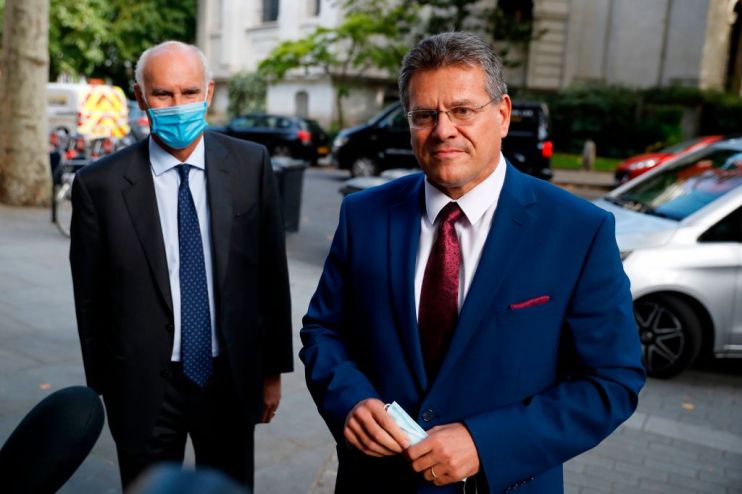Brexit: EU threatens legal action against UK after ‘seriously damaging trust’

Brussels has threatened the UK with legal action for Boris Johnson’s attempts to breach the Brexit withdrawal agreement, claiming that his actions have “seriously damaged trust between the EU and the UK”.
The European Commission’s vice president Maroš Šefčovič warned Cabinet Office minister Michael Gove today that the withdrawal agreement was a “legal obligation”, and that the EU “expects the letter and spirit of this agreement to be fully respected”.
The EU also claimed that Downing Street’s attempts to alter the terms of the withdrawal treaty put Northern Ireland’s Good Friday agreement in danger.
However, Gove has hit back saying that the UK government would not be backing down and changing its amendments to the withdrawal agreement.
Šefčovič met with Gove this afternoon as a part of an emergency meeting of the UK-EU Joint Committee.
The EU called the meeting after Downing Street put forward its internal market bill yesterday, which made “clarifications” to the withdrawal agreement as it relates to Northern Ireland.
Northern Ireland will remain in the EU customs union from 1 January, while the rest of the UK will not, in order to avoid a hard border with the Republic of Ireland.
Before the Open newsletter: Start your day with the City View podcast and key market data
The internal market bill seeks to give the UK powers to unilaterally “disapply” rules about movement of goods from Great Britain to Northern Ireland stated in the withdrawal agreement, after the end of the Brexit transition period on 31 December.
The bill also seeks to give the UK control over how to implement the EU’s state aid rules in Northern Ireland.
The EU said these actions “would be in clear breach” of the withdrawal agreement and that the UK has until the end of the month to drop the legislation, however Gove has said today that the UK “would not and could not” do so.
It is thought that failure to do so would likely lead to an end of trade talks and the UK leaving the EU’s customs union and single market on a no-deal basis on 31 December.
The EU said: “[Šefčovič] reminded the UK government that the withdrawal agreement contains a number of mechanisms and legal remedies to address violations of the legal obligations contained in the text – which the European Union will not be shy in using.”
The Sun reported yesterday that the reason for Johnsons’s actions was that the Brussels was threatening to block the transport of goods between Northern Ireland and Great Britain after the UK leaves the transition period.
Today, the Prime Minister’s official spokesman said the attempt to modify the withdrawal agreement was to ensure the free flow of trade between the UK’s four countries.
British attorney general Suella Braverman released a statement about the government’s actions today, which conceded that the terms of its new bill “may be exercised in a way that is incompatible with provisions of the withdrawal agreement”.
“It is an established principle of international law that a state is obliged to discharge its treaty obligations in good faith,” she said.
“This is, and will remain, the key principle in informing the UK’s approach to international relations.”
Braverman added: “In particular it ensures that the government will be able to deliver its commitments to protect peace in Northern Ireland and the Belfast/Good Friday Agreement, and to strengthen and maintain the UK internal market.”
Chief UK negotiator Lord David Frost also met his EU counterpart Michel Barnier today for the final time during the current round of post-Brexit trade deal talks.
Both sides have put a deadline of 15 October to agree to a deal, however the latest fiasco over Northern Ireland has increased the prospect of a no-deal exit.
Barnier has said in the past that there can be no trade deal between the UK and EU if one side does not respect the withdrawal agreement.
A senior EU source told The Times: “My gut feeling is that the British government has opted for no-deal.”